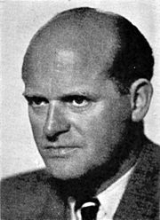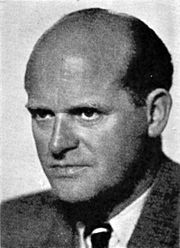
Nils Flyg
Encyclopedia

Sweden
Sweden , officially the Kingdom of Sweden , is a Nordic country on the Scandinavian Peninsula in Northern Europe. Sweden borders with Norway and Finland and is connected to Denmark by a bridge-tunnel across the Öresund....
Communist
Left Party (Sweden)
The Left Party is a socialist and feminist political party in Sweden, from 1967 to 1990 known as the Left Party – The Communists .On welfare issues, the party opposes privatizations...
politician who turned pro-Nazi
Nazism
Nazism, the common short form name of National Socialism was the ideology and practice of the Nazi Party and of Nazi Germany...
during World War II
World War II
World War II, or the Second World War , was a global conflict lasting from 1939 to 1945, involving most of the world's nations—including all of the great powers—eventually forming two opposing military alliances: the Allies and the Axis...
.
Nils Flyg was born and raised in Södermalm
Södermalm
Södermalm, often shortened to "Söder", is a district in central Stockholm. It covers the large island formerly called "Åsön". With a population of 99,685, it is one of the most densely populated districts of Scandinavia...
, a working-class area of Stockholm
Stockholm
Stockholm is the capital and the largest city of Sweden and constitutes the most populated urban area in Scandinavia. Stockholm is the most populous city in Sweden, with a population of 851,155 in the municipality , 1.37 million in the urban area , and around 2.1 million in the metropolitan area...
. Early on he joined the Swedish Social Democratic Party
Swedish Social Democratic Party
The Swedish Social Democratic Workers' Party, , contesting elections as 'the Workers' Party – the Social Democrats' , or sometimes referred to just as 'the Social Democrats' and most commonly as Sossarna ; is the oldest and largest political party in Sweden. The party was founded in 1889...
's youth organization, the Swedish Social Democratic Youth League
Swedish Social Democratic Youth League
The Swedish Social Democratic Youth League is a branch of the Swedish social democratic party Socialdemokraterna and the Swedish Trade Union Confederation...
. In 1917, Flyg took part in the founding of a new leftist
Left-wing politics
In politics, Left, left-wing and leftist generally refer to support for social change to create a more egalitarian society...
party, a group headed by Zeth Höglund
Zeth Höglund
Carl Zeth "Zäta" Konstantin Höglund was a leading Swedish communist politician, anti-militarist, author, journalist and mayor of Stockholm ....
and Karl Kilbom
Karl Kilbom
Karl Kilbom was a Swedish Socialist politician.-Youth:As the son of a blacksmith, Karl Kilbom grew up in a working-class family of Walloon origin in the small town of Österby outside Uppsala, where he started working in the steel mills at an early age.In the year 1900, a socialist agitator visited...
, which would soon become the Communist Party of Sweden
Left Party (Sweden)
The Left Party is a socialist and feminist political party in Sweden, from 1967 to 1990 known as the Left Party – The Communists .On welfare issues, the party opposes privatizations...
.
Flyg became an important leader of the Communist Party, wrote books and went on political trips to the Soviet Union
Soviet Union
The Soviet Union , officially the Union of Soviet Socialist Republics , was a constitutionally socialist state that existed in Eurasia between 1922 and 1991....
. In the general election of 1928
Swedish general election, 1928
Elections to the second chamber of the Riksdag were held 15 September–21 September 1928. This election is often called the "Cossack Election" due to the harsh tone and aggressive criticism on both sides....
, with the Flyg-dominated Communists cooperating with the dominant Social Democratic Party, he failed to achieve an influential position as voters failed to show substantial support for a Communist-Social Democratic coalition. In 1929 Flyg, along with the majority of the party's membership, was accused of insufficient loyalty to the Soviet-dominated Comintern
Comintern
The Communist International, abbreviated as Comintern, also known as the Third International, was an international communist organization initiated in Moscow during March 1919...
and expelled from the party. The same year Flyg and Kilbom founded a new, parallel Communist Party, which claimed to be the real Communist Party of Sweden.
Initially Flyg and Kilbom attempted to reconcile with the Comintern, something that soon proved fruitless. They gradually developed an animosity towards Stalinism
Stalinism
Stalinism refers to the ideology that Joseph Stalin conceived and implemented in the Soviet Union, and is generally considered a branch of Marxist–Leninist ideology but considered by some historians to be a significant deviation from this philosophy...
. By 1934 the party had changed name to the Socialist Party
Socialist Party (Sweden, 1929)
The Socialist Party , initially known as the Communist Party of Sweden , was a political party in Sweden active from 1929 to 1948. The party was founded in 1929 by the major faction of the Communist Party of Sweden, led by Karl Kilbom and Nils Flyg, as the party split into two parties with the same...
(Socialistiska partiet). At first, the Socialist Party still supported the Soviet Union but condemned the Stalinist leadership. But by the end of the 1930s, the party had changed its view and criticized the whole of the Soviet Union, a stance that gradually developed to a foreign policy embracing Nazi Germany
Nazi Germany
Nazi Germany , also known as the Third Reich , but officially called German Reich from 1933 to 1943 and Greater German Reich from 26 June 1943 onward, is the name commonly used to refer to the state of Germany from 1933 to 1945, when it was a totalitarian dictatorship ruled by...
.
In 1937 Kilbom was expelled from the party, after a few years of disputes and personal struggle between the two leaders. After the expulsion of Kilbom a majority of the members of the party left. The Socialist Party shrank dramatically and Flyg became more and more politically isolated.
At the beginning of World War II
World War II
World War II, or the Second World War , was a global conflict lasting from 1939 to 1945, involving most of the world's nations—including all of the great powers—eventually forming two opposing military alliances: the Allies and the Axis...
, Flyg came out in opposition to fascism
Fascism
Fascism is a radical authoritarian nationalist political ideology. Fascists seek to rejuvenate their nation based on commitment to the national community as an organic entity, in which individuals are bound together in national identity by suprapersonal connections of ancestry, culture, and blood...
, and the Nazi-Soviet pact
Molotov-Ribbentrop Pact
The Molotov–Ribbentrop Pact, named after the Soviet foreign minister Vyacheslav Molotov and the German foreign minister Joachim von Ribbentrop, was an agreement officially titled the Treaty of Non-Aggression between Germany and the Soviet Union and signed in Moscow in the late hours of 23 August 1939...
in his eyes proved that Stalinism was just as bad as fascism. But when Hitler broke the pact with Stalin, and Germany launched the invasion against the Soviet Union, Flyg decided that he had to support the Nazis against Stalin, hoping it would lead to the end of Stalinism. Financial constraints led him to approach the German High Commission in Stockholm. Initially, the Germans turned down his request for funding, but in the final stages of the war (when the Germans felt a more urgent need for allies in the Swedish politics) funding was granted. Gradually, Flyg and his party developed a pro-Nazi position.
Still, Nils Flyg never fully gave in to Hitlerism. He was neither an adherent of core fascist or racist policies, and considered himself a socialist until his death. He was against capitalism
Capitalism
Capitalism is an economic system that became dominant in the Western world following the demise of feudalism. There is no consensus on the precise definition nor on how the term should be used as a historical category...
and imperialism
Imperialism
Imperialism, as defined by Dictionary of Human Geography, is "the creation and/or maintenance of an unequal economic, cultural, and territorial relationships, usually between states and often in the form of an empire, based on domination and subordination." The imperialism of the last 500 years,...
and openly supported the basic ideas of Marx
Karl Marx
Karl Heinrich Marx was a German philosopher, economist, sociologist, historian, journalist, and revolutionary socialist. His ideas played a significant role in the development of social science and the socialist political movement...
and Lenin
Vladimir Lenin
Vladimir Ilyich Lenin was a Russian Marxist revolutionary and communist politician who led the October Revolution of 1917. As leader of the Bolsheviks, he headed the Soviet state during its initial years , as it fought to establish control of Russia in the Russian Civil War and worked to create a...
. In one speech to a group of Swedish Nazis, he caused confusion when he declared: "Death to communism! Long live communism!".

